Tehran Confirms Visit Of Qatar's Emir Amid Deadlock In Nuclear Talks
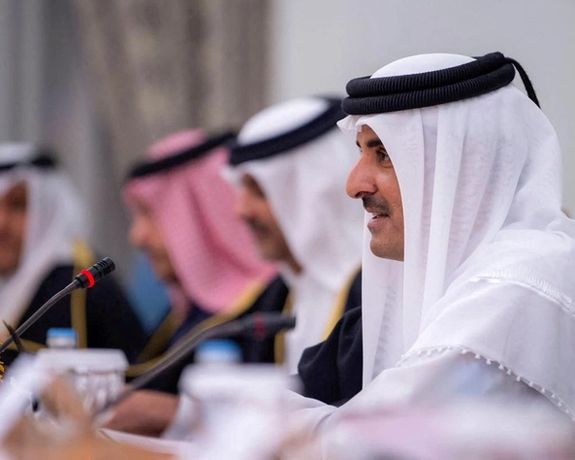
Qatar's Emir will visit Iran soon, Iran's foreign ministry spokesman Saeed Khatibzadeh confirmed on Monday during his weekly news conference.

Qatar's Emir will visit Iran soon, Iran's foreign ministry spokesman Saeed Khatibzadeh confirmed on Monday during his weekly news conference.
"The visit of the Emir of Qatar to Tehran is on the agenda and includes bilateral, regional and international issues. After this trip, Iran's President will travel to a Persian Gulf country," Khatibzadeh said.
Citing a source, Reuters reported on Sunday that Emir Sheikh Tamim bin Hamad al-Thani will visit Iran before traveling to Germany, Britain and other European states to discuss efforts to revive Iran's 2015 nuclear deal and energy security in Europe.
The source added the Emir's trip aimed at bringing parties to the Iran nuclear pact to a "new middle ground." This follows an impasse in indirect Iran-US talks over Tehran's insistence that Washington remove the Islamic Revolutionary Guard Corps (IRGC) from the US Foreign Terrorist Organization list.
Other regional countires, including Saudi Arabia, Israel and the United Arab Emirates are opposed to reviving the JCPOA by lifting major economic sanctions and possibly removing IRGC from the US Terror list.
Qatar's Emir last visited Iran in January 2020 to reduce tensions between Tehran and Washington following the killing of top Revolutionary Guard Commander Ghasem (Qasem) Soleimani by the United States whilst on a visit to Iraq.
Iranian state media also reported the Emir's trip was meant to follow up on several bilateral memoranda of understanding signed during Iran's President Ebrahim Raisi's visit to Doha in February.
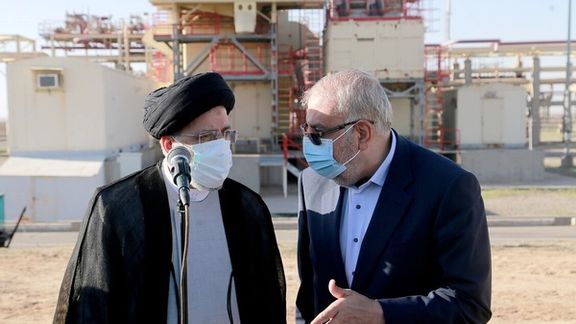
Iranians wonder what has happened to tens of billions of dollars in recent oil revenues, when the economy weakens, the currency keeps falling, and prices rise.
With the deterioration of the economic situation in recent days and the danger of a social explosion, even state-controlled media publish interviews and comments about the mystery of oil revenues and higher taxes collected by President Ebrahim Raisi’s government.
According to official statements by the president and the oil minister, Iran has earned at least $45 billion in the past 12 months from higher exports and prices of crude oil and refined oil products. This is double of what Iran managed to earn in 2020, without any visible impact on the economy.
Hossein Raghfar a professor of economics in Zahra University in Tehran told the Iranian Labour News Agency, ILNA, that the money is being taken out of Iran by corrupt officials.
“The question now is why the impact these revenues are not being felt,” Raghfar said, and insisted, “One of the main reason is flight of capital from the country.”
He did not provide any details or evidence for his claim of massive capital flight, but a recent scandal surrounding the family of the parliament speaker traveling to Turkey for luxury shopping and reportedly buying two expensive apartments there for $1.6 million, speaks volumes about corruption and money taken out of the country by the elite.
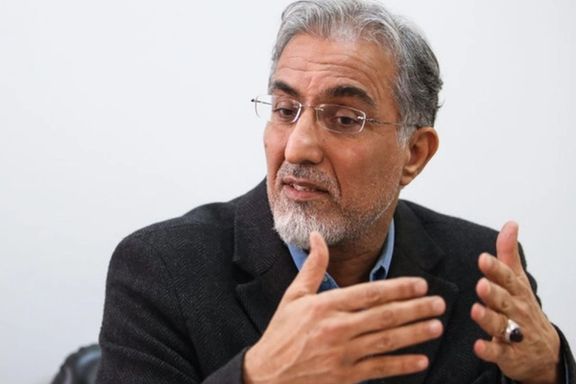
A Turkish nationwide news channel, TGRT, not only confirmed claims by Iranian sources that Mohammad Bagher Ghalibaf (Qalibaf) family purchased apartments but reported that 500 luxury units in the same high-rise complex have been purchased by families of Iranian officials. That would mean around $500 million of illicit funds taken out of the country and invested in just one location in Turkey.
Raghfar said that if government claims of exporting around one million barrels of crude per day are true, Iran can expect around $100 billion of revenue from its traditional financial lifeline. That kind of money should stop the fall in the value of rial, which reached a four-month low on Saturday trading at 285,000 to the US dollar. Just in late 2017, before the United States pulled out of the nuclear agreement known as JCPOA, the rial was trading at 33,000 to the dollar – an almost ninefold fall in less than five years.
The former head of the central Bank, Abdolnaser Hemmati, issued a short video on Sunday saying that the Raisi administration can be called “The sultan of printing money.” Raisi has been claiming that he stopped his predecessor’s practice of generating money for the government by printing more banknotes, but Hemmati said that according to new central bank date the government printed close to $6 billion additional money from August to March, which fuels inflation.
Raghfar also drew attention to large quasi-government companies not paying any taxes, and instead receiving subsidies. These companies are run by political appointees who are friends or family members of top government officials and can easily share funds with others in their circle.
He went to say that currently all major government institution are controlled by conservative (loyal to Supreme Leader Ali Khamenei) and the Raisi government has no excuse of disunity in failing to improve the economy. Why the government is eliminating subsidies for essential commodities, raising the price of bread fivefold, he asked, and said it is not clear what is happening to public wealth.
“Iran’s economy is hostage to various mafia interests, who spend a lot of [public] money and embezzling huge funds,” Raghfar said.
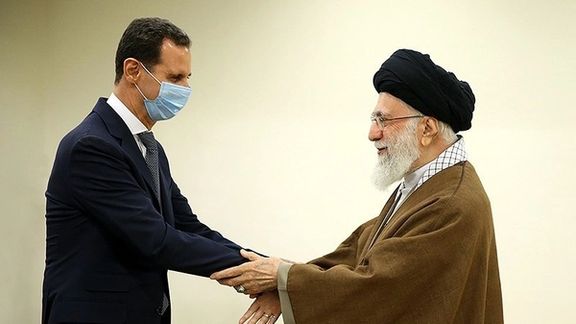
Syrian President Bashar al-Assad paid a quick visit to Tehran Sunday to meet with the Supreme Leader and president for the second time in the past decade.
"Today's Syria is not what it was before the war, although there were no destructions then, but the respect and prestige of Syria is greater than before, and everyone sees this country as a power," Khamenei told Assad, according to Iran' state TV.
Khamenei criticized Arab countries for normalization of relations with Israel. “Some leaders of countries that are neighbors to us and you, have relations with the leaders of the Zionist regime and drink coffee together," he said.
"However, people of the same countries take to the streets on Qods (Quds) Day and chant anti-Zionist slogans, and this is the current reality of the region,” he claimed.
Assad also made a rare trip to the UAE in March, which has normalized its relations with Israel, for the first time since 2011. A week after the visit, Iran's foreign minister, Hossein Amir-Abdollahian took a trip to Damascus during which he said the Islamic Republic welcomed normalization of Syria's relations with Arab countries.
Some Iranians speculated on social media about the possible reasons for the trip, saying that Russia’s invasion of Ukraine might be creating a vacuum in Syria and perhaps a redefinition of Iran’s role.
Referring to the slain commander of the Qods Force of the Revolutionary Guard (IRGC), Ghasem Soleimani, who was killed by American drones in Baghdad in January 2020, Khamenei said Soleimani harbored a "special zeal for Syria" and made sacrifices as he would during Iran's own eight-year war with Iraq (1980-1988).
Soleimani is criticized for involving Iran-backed ground forces in Syria to support Assad and being responsible for the death of tens of thousands of civilians. He supported Russia’s intervention in Syria supplying the ground forces while Moscow used heavy bombing to crush the anti-Assad rebellion.
Khamenei also stressed that the government of President Ebrahim Raisi is "very serious about the issue of Syria" and urged using the opportunity to promote bilateral relations. President Raisi who met separately with the Syrian president said in their meeting that his government's priority was to strengthen strategic ties with Syria.
"Some believe that Iran's support for the "Resistance Axis" is through providing weapons whereas the biggest support and assistance offered by the Islamic Republic is strengthening the spirit of resistance and its continuation," Khamenei said.
Since 2014, the IRGC has deployed brigades of Afghan, Pakistani, and Iraqi Shiites that it has recruited and trained.
In his meeting with Khamenei, Assad stressed the "strategic relations between Iran and Syria" as a major factor in preventing Israel from "dominating the entire region."
According to Nour News, a website linked with the Secretary of Iran's Supreme National Security Council Ali Shamkhani, Assad whose rare visit had not been announced, immediately left Tehran for Damascus.
Assad had visited Tehran once before after the civil war in his country in February 2019. The visit became very controversial as his trip was organized and attended by Soleimani, without the knowledge of the government of Raisi's predecessor, President Hassan Rouhani.
In protest to being kept in the dark, Foreign Minister Mohammad-Javad Zarif who had not even been invited to Khamenei's meeting with Assad resigned from his post. The resignation was not accepted by Rouhani who insisted he should remain in his post.

Several female hairdressers have been arrested and others have been summoned in Iran’s over a new set of restrictions on activities of women’s beauty salons.
According to information received by Iran International, in the northeastern city of Mashhad Women Hairdressers Union has recently announced a ban on a series of activities, including waxing of private parts, tattoos and piercing, injecting Botox and other cosmetic subdermal fillers, nail enhancements and eyelash extensions as well as “unconventional” dress code and playing western music at the salons.
A similar notification for the new bans has also been sent to female hairdressers in several other provinces of the country, threatening them with legal action if they do not comply.
In 2018, Iran also arrested dozens of people, including Instagram models and beauty salon owners, for posting photos online, and in 2007, police in Tehran closed dozens of barbershops and hairdressers in a fortnight as part of its crackdown aimed at enforcing Islamic dress codes among young Iranians.
Mashhad is home to numerous hardliner clerics who are against women’s presence in male dominated venues. Firebrand representative of the Supreme Leader in the city, Ayatollah Ahmad Alamolhoda has been banning concerts and cultural events for years.
Alamolhoda, who is father-in-law of President Ebrahim Raisi, has time and again urged people to reproach women with poorly-fitting hijab and admonish them, saying women with loose-fitting hijab should not feel secure in public.
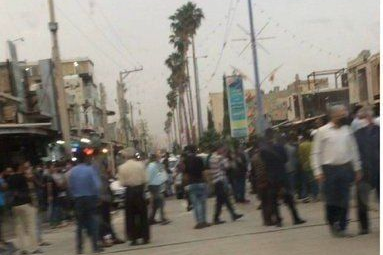
Security forces in Iran are on high alert to prevent unrest over rising bread prices, as unrest has been reported in Khuzestan Province in the past two days.
According to some social media reports and videos, security forces used tear gas in Sousangerd and Izeh, Khuzestan, to disperse protesters Saturday evening. Social media users have also reported security forces' use of firearms and extensive arrests of activists in some cities of the oil-rich province.
Khuzestan has been the scene of widespread protests in the past few years. Protests over water shortage in July 2021 lasted for over a week during which at least eight protesters were shot dead by security forces.
For nearly three days, authorities have shut down or slowed down mobile internet access in some cities in Khuzestan including Sousangerd, Behbahan, Abadan, Ahvaz, and Hamidieh. Internet disruption came after a call to protest began circulating on social media Thursday.
Security forces have a visible, large presence in various towns and cities of Khuzestan, the reformist Eslahat News reported Sunday. The website also said local authorities are not offering any explanation for the disruption to the internet and text messaging services.
Verifying the reported protests in Khuzestan cities since Thursday has proved difficult as very few videos have been distributed. By shutting down mobile internet and reducing the speed of broadband, authorities have ensured videos of protests will not spread on social media or be shown by foreign-based media outlets.
The Student Basij, a pro-government student union affiliated with the Revolutionary Guard, warned President Ebrahim Raisi Thursday that the abrupt end to flour subsidy could cause unrest. "The society is not prepared for this level of price increases and this level of disorganization in its execution," the union said in a letter to Raisi.
The hike in the price of bread is a result of a government decision to scrap the subsidy for imported wheat, flour and other essential items. The higher cost of flour is also affecting a wide variety of breads, cakes and pastries including children's snacks, fast food such as hamburgers and sandwiches, and traditional soup noodles.
A video showing protests in Khuzestan on Saturday
Authorities have been making contradictory statements about the new prices, manner of direct payment of cash subsidies to people for bread, and the time of the implementation of their plans.
In a meeting with representatives of businesses and trade associations Saturday evening, Raisi denied having any secret plans to remove the subsidies of basic commodities and insisted that he only wants to reform the subsidy system, giving the money directly to people to prevent alleged corruption.
"People [in Khuzestan] are angry because they don't know what is happening and the authorities are not talking [about their plans], or even worse, making unacceptable excuses," an unnamed civil activist told Emtedad News.
"One of the justifications for the hike in bread prices was claiming it was being smuggled [to neighboring countries] which was very senseless and angered people even more," he said referring to officials' claim that increasing the price would prevent smuggling of flour and flour-based products such as pasta to neighboring countries where they are much more expensive than in Iran.
Some politicians and experts on Sunday mocked the government claim of trying to prevent smuggling, saying that this is an excuse often used by officials to justify their own economic failures.
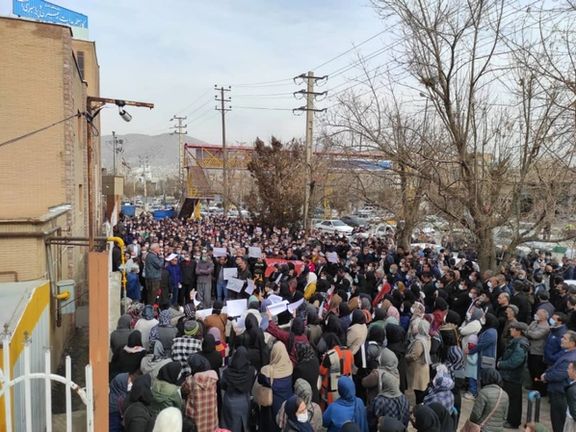
Retirees and pensioners of Iran’s Social Security Organization staged protest rallies in several Iranian cities on Sunday, amid worsening economic conditions.
According to the US-based Human Rights Activists' News Agency (HRANA), the demonstrations were held at provincial offices of the organization in Tabriz, Ahvaz, Mashhad, Kermanshah and some others.
Retirees are protesting against meager pensions, issues in their medical insurance services and poor living conditions in general. The steep fall in the value of Iran’s currency has slashed the purchasing power of retirees and workers.
Similar protest rallies have also been held in various cities in the past few days by various other groups, including ranchers, farmers, miners, and teachers.
On Saturday, ranchers in at least 10 cities gathered at the offices of the Agriculture Ministry, miners from the northern Mazandaran province held a rally in front of Iran’s Mineral Processing and Processing Company in Tehran, and workers of Gachsaran petrochemical company in Kohgiluyeh and Boyer-Ahmad Province staged a strike.
People in several towns of the southwestern Khuzestan province also held demonstrations against the rise in bread prices.
Moreover, the Coordination Council of Iranian Teachers’ Trade Associations issued a statement Sunday saying if teachers detained in the past two weeks are not released, they will hold another nationwide protest.
Several teachers and union activists were arrested before, during and after the latest round of protests across the country on May 1, the international Labor Day.
People from different walks of life, including teachers, nurses, firefighters, and even staff members of the judiciary department and prison guards, have protested or gone on strikes to demand higher salaries.